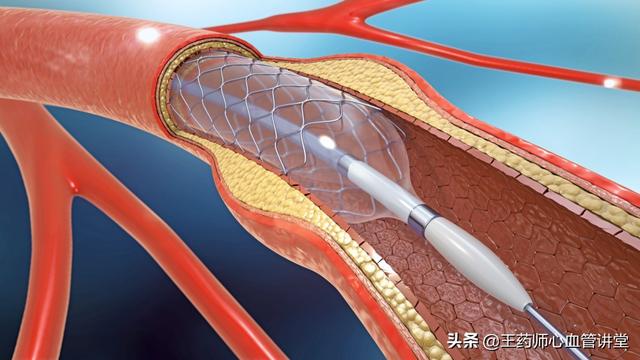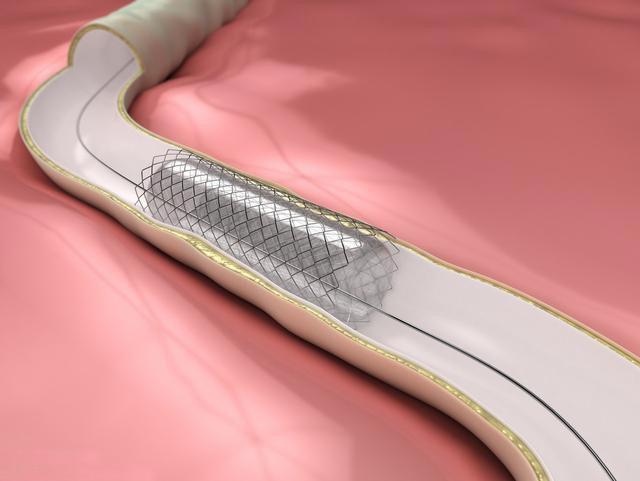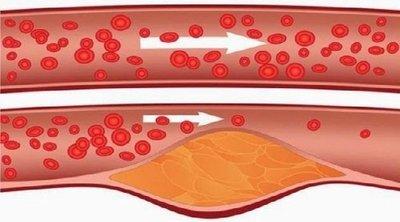How long can I live after a heart attack stent?
This question is somewhat one-sided. Under normal circumstances, the implantation of a stent in the coronary artery is only a solution to the current situation of the cardiovascular system, and it would be a big mistake to think that the stent will be a permanent solution and everything will be fine. Therefore, after stenting, first of all, you have to take medication according to the doctor's prescription, some drugs need to be taken for life regardless of whether there are symptoms or not; secondly, you have to strictly monitor your blood pressure, blood lipids and blood sugar, and make timely adjustments if there are any abnormalities, so that they are always maintained at a good level; then, you have to have a kind of healthy lifestyle, quit smoking and drinking, eat a light diet, exercise more, be optimistic and actively participate in the necessary social activities, and so on; and lastly, you have to have a kind of healthy life style, quit smoking and drinking, eat a light diet, exercise more, be optimistic, actively participate in necessary social activities. For this kind of disease, in layman's terms, satisfied with not caring can't, think too much can't, so we must do strategically important, tactically contempt, listen to the doctor's words, can keep safe.
Hi, I'm Pharmacist Wang and I'm happy to answer this question.
How long can I live after a heart attack stent?
Generally heart attack patients with severe infarcts need to have stents placed. Stenting can improve a patient's blood supply to the heart in a very short period of time, allowing endangered patients to maintain a normal life, and plays an important role in improving a patient's quality of life. Both the procedure and the stent itself are relatively safe. Stenting is a therapeutic procedure whose purpose is to cure and save lives and to prolong the life of the patient. For heart attack patients, stents are used to save lives. Therefore, stenting will only make the patient live longer. As for how long the patient can live, it depends on many factors, such as whether the patient takes regular medication for a long period of time after the procedure, whether he/she has regular checkups, whether he/she can control other risk factors, whether he/she lives a healthy life, and so on.
So there are a few things to keep in mind if you want to live a long life.

1. Adherence to medication
The onset of heart attack is caused by the disease itself, even if a stent is placed, it only relieves the symptoms and does not mean that the disease is cured, and the patient needs to adhere to the medication.
2. Lifestyle adjustments
Stent implantation is the use of physical methods to artificially restore myocardial blood supply, which is only effective in narrowing the diseased area, but cannot change the risk factors that lead to the emergence of the disease. After stenting, one should adhere to a healthy lifestyle, abstaining from smoking, restricting alcohol, and controlling the diet, and eat a light diet, choosing a low-fat, low cholesterol, and low-sugar diet, paying attention to the supplementation of vitamins and proteins, and actively controlling the body weight.
3. Reasonable exercise
After stent surgery, reasonable exercise is very important, the general principle of exercise is "step by step", at the beginning choose gentle exercise, such as walking, and then can be fast walking, jogging, and gradually increase the amount of exercise, but the maximum amount of exercise should not be more than 70-80% of the preoperative. If chest pain, shortness of breath, asthma and fatigue occur during exercise and workout, it is recommended that exercise should be stopped immediately. Some patients may experience sudden loss of control of the heart or rapid heartbeat, and some may feel mild dizziness and fatigue.

4. Adjusting one's mindset
Some patients become nervous and overly worried after stent surgery, such as worrying about the stent falling off or breaking, not daring to move or run, and full of psychological burden. In fact, the stent is generally made of stainless steel alloy material, which has strong supportive force, corrosion resistance and molding memory function, and will not rust and collapse. The high pressure given during the operation to expand the stent makes the stent tightly embedded in the coronary artery wall and will not be displaced. Therefore, it is important to maintain an optimistic and positive attitude after the procedure.
5. Periodic review
Stenting is not a one-off procedure and regular follow-ups are required after surgery.
How long you live after a heart attack stent is up to you; a healthy lifestyle, necessary medications, and an aggressive approach to rehab will lead to a longer life.
I am Pharmacist Wang, insisting on spreading the knowledge of cardiovascular and cerebrovascular diseases with simple and easy-to-understand words, and dedicating my own small efforts for a healthy China. If you think my answer is helpful to you, please leave a like! In addition, if you still have heart attack stent surgery related questions, welcome to leave a message, we discuss together!
How long can you live after a heart attack stent? Actually, this question should be viewed holistically:
Survival time after heart attack stenting depends on the patient's underlying disease and postoperative management and maintenance. If the patient has fewer underlying diseases or adheres to the treatment after the operation, he or she can usually reach the life expectancy. Patients first need to pay attention to lifestyle intervention after heart attack, including reasonable diet, moderate exercise, smoking cessation and alcohol restriction, and psychological balance. In addition, post-infarction drug therapy is the cornerstone of coronary heart disease treatment, clinical requirements for dual antiplatelet therapy for at least one year, and emphasize lipid stabilization, which can achieve plaque stabilization and slow down the occurrence of acute cardiovascular events.
At the same time, myocardial infarction does not happen overnight, that is to say, these patients usually have high blood pressure, high blood lipids and other underlying medical conditions, so the treatment of underlying diseases is also very necessary.
As the saying goes, life and death are in the balance, all we have to do is fulfill the part we can do, stenting is just the beginning, never get over a good wound!
In the end, I hope everyone doesn't need to put in a brace!
You need to consult a professional (fortune teller) on this one.
No doctor can give an answer because the demands of counting lives are beyond our ability.
Heart attack is one of the clinical manifestations of coronary heart disease, once the sudden that is critical and urgent, this time you need to quickly restore blood circulation, otherwise the risk of death is very high, and stents and bypass is better known as the two emergency measures, but any surgery there are risks, so the stents and bypass is not infallible, if there is a faulty operation or other errors during the operation, it will indeed have an impact on the patient's life.

But if all goes well, it's really unknown how long the patient will survive!
I understand the mistrust of stents, always thinking that when they are implanted, they will drastically disrupt your health and affect the length of your life.
But in fact, this concern is unnecessary, stemming from the various false rumors on the Internet nowadays, the concept of many things have been distorted, and stents are even the best of them, stents really can not cure the condition, and even in a sense, there is no therapeutic effect.
However, since its introduction, the stent has saved countless lives, and as a first aid measure, it deserves to be No. 1, without any "real" doctor emphasizing its therapeutic role, we just apply first aid where it should be applied most to save the patient's life.
In addition, the stent is not a harmful thing, its implantation will indeed have some damage to the lining of the blood vessels, more likely to form plaque thrombosis, but do you remember: "at the time of the stent scene", not stenting on the death, and stenting need to face the subsequent recurrence, and then give you the opportunity to choose, don't you still so choose?

Survival after stenting!
Like I said above, it does tend to get clogged up again after a stent, but that doesn't mean it's going to die.
As an old doctor who has been fighting in the clinical front line, I have seen more patients than you can imagine, of which the proportion of patients after stenting is also quite a lot, and there is no lack of examples of people who have lived for more than ten or twenty years, so you do not need to worry too much about it, and we need to know that long-term negative emotions will lead to neurological dysfunction, which will make the vasospasm constriction, which will further aggravate and accelerate the condition, and we need to pay attention to avoid it.

I hope my science helps!
If there's anything you don't understand, comment and private message me!
Actually, this question is a non-rigorous question. After coronary stenting, some people do have the problem of restenosis in that branch of the coronary artery and need surgery. In addition, after coronary stenting, aggressive management of blood pressure, blood glucose, and lipids, as well as good lifestyle habits are necessary and have an impact on prognosis. It should also be emphasized that coronary vessels that were not in trouble when the stent was implanted may also develop problems at a later date. In addition, some patients may also have other systemic disorders, and all of the above have an impact on the prognosis. Therefore, it is not possible to generalize how long one can live after stenting. In conclusion, after coronary stenting for coronary artery disease, it is important to take the medication as prescribed by the doctor, and at the same time pay attention to the active management of blood pressure, blood lipids and blood glucose at the same time, pay attention to maintaining good living habits, and at the same time pay attention to quitting the bad habits, and regular review, which is beneficial to the long-term prognosis!
After a heart attack stent, sticking to your meds and following your doctor's orders can last as long as the average person's life expectancy
Survival time after heart attack stenting depends on the patient's underlying disease and postoperative management and maintenance. If the patient has fewer underlying diseases or adheres to the treatment after the operation, he or she can usually reach the life expectancy. Patients first need to pay attention to lifestyle intervention after heart attack, including reasonable diet, moderate exercise, smoking cessation and alcohol restriction, and psychological balance. In addition, post-infarction drug therapy is the cornerstone of coronary heart disease treatment, clinical requirements for dual antiplatelet therapy for at least one year, and emphasize lipid stabilization, which can achieve plaque stabilization and slow down the occurrence of cardiovascular acute events
This question and answer are from the site users, does not represent the position of the site, such as infringement, please contact the administrator to delete.